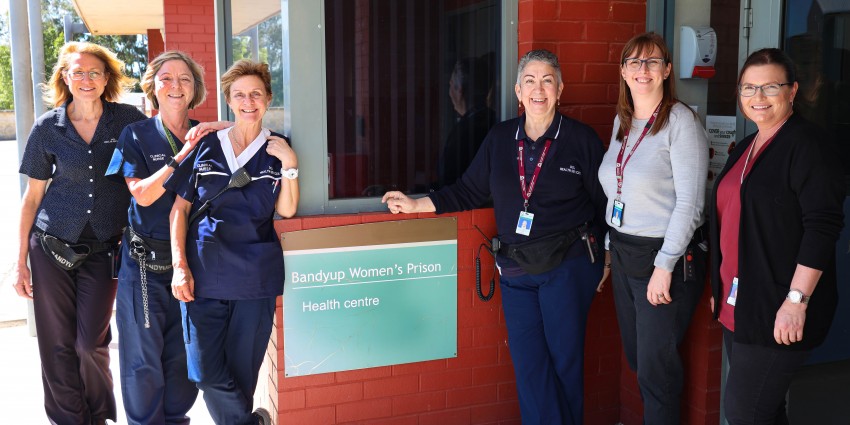
This week is Women’s Health Week and an opportunity to highlight the Bandyup Women’s Prison health centre and the staff who help improve the physical health and wellbeing of women prisoners.
Walking toward the health centre, two young women prisoners were leaving. One was pushing a three-month-old baby in a pram. The other’s two-month-old son was out on a family visit.
"The health centre staff have been so helpful," one of the mothers said. "It’s good to be able to tap into helpful advice, particularly around breastfeeding."
The other said the staff had been amazing at supporting and reassuring her after birth complications.
The babies were born at King Edward Memorial Hospital and the mothers and babies returned to Bandyup when they were well enough, thanks to a special arrangement between the Departments of Justice and Health.
Bandyup mothers are allowed to keep their babies with them until they are 12 months old. Depending on circumstances, the mothers may then be transferred to Boronia Pre-Release Centre for Women where their children can live with them until they are four years old and they can enjoy day visits with older children.
The healthy mothers are not only receiving expert health care at the prison – they are also learning about healthy family eating, the importance of vaccinations and regular check-ups and screening, and how to avoid risky behaviours.
The centre’s team of 15 nurses, as well as a doctor who works nine days a fortnight, hold portfolios in fields such as asthma, blood borne viruses, cardiovascular disease, diabetes, incontinence and sexually transmissible infections.
Clinical Nurse Manager Jean, said Bandyup housed some of WA’s most vulnerable women, many of them victims of child sex abuse and domestic violence.
"Many women prisoners are smokers, have a history of illicit drug use, have not finished high school and have a chronic health condition such as asthma, cardiovascular disease, diabetes or hepatitis C," Jean said.
"They are often very unwell when they come to prison, with serious conditions that may not have been treated for years. I am a continence advisor and I find it so rewarding to be able to give women back their dignity and control, sometimes with just one continence aid.
"Women may not have been able to talk about this problem for years, but in a supportive environment where we treat them with respect, they open up. One patient
developed incontinence after childbirth in her twenties and told nobody until she was in her fifties. Others are incontinent as a result of sexual abuse."
Nurse Susan, who has been a prison nurse for 15 years, is a specialist in treating blood-borne viruses such as hepatitis C. Corrective Services won a WA Health Excellence Award for treating prisoners with this disease.
"Injecting drug use and needle-sharing are some behaviours that can lead to blood-to-blood contact," Susan said. "Women in prison often come from marginalised groups where they can’t access medical care or prefer not to.
"This is an ideal place to detect and treat women with undiagnosed hepatitis and other conditions. They certainly leave prison in better health, having received dental treatment and vaccinations for rubella and flu, and screening for breast, bowel and cervical cancer.
"These women are often totally exhausted with life. A lot have lost years of their lives on drugs. Through practising trauma-informed care, we make them feel better, and better able to cope."
Nurse Janet, who has also worked at Roebourne Regional Prison, said Bandyup’s proximity to major hospitals was a big advantage in emergencies. "As well, women benefit from having more visitors," she said. "Women are pivotal in child-rearing and during the COVID-19 shutdown, many benefitted from Skype visits and being able to see their own families, pets and houses."
Pharmacy Technician Fiona administers medications and said it was gratifying to see the changes in women who, until being imprisoned, may not have been taking medication for conditions as serious as diabetes.
"Some may have been living on the streets for years and we get their blood sugar levels down from in the 20s to the right levels," Fiona said. "Not only does their health improve, but their attitude and behaviour does too."
Senior Medical Receptionist Jenelle arranges visits from an optician, physiotherapy and podiatrist and liaises with a movements officer to organise women’s visits to external medical appointments. She has worked at Bandyup for 13 years. Clinical Nurse Manager Jean said the centre’s smooth running depended on Jenelle’s organisational skills.
"We see the women as patients, not prisoners," Jean said. "We value them and treat them with respect. We empower them and validate them."
Bandyup’s doctor said many of the women had never had a positive health experience until being incarcerated.
"This is a fantastic opportunity for us to make a difference in their lives," the doctor said.
"It’s nothing like caring for the worried well: we care for people who have significant illness. When I started here I had no reference for the level of comorbidity, particularly in Aboriginal women. It’s acute.
"We build rapport with them and listen. We want them to trust us so they can come to us in a crisis.
"I hope that if we can interact positively with them they will seek medical help once they’re released.
"An event like Women’s Health Week provides us the opportunity to acknowledge our achievements as a team. We come to work and do our job without thinking about what it is we really do. And it’s pretty amazing!"


